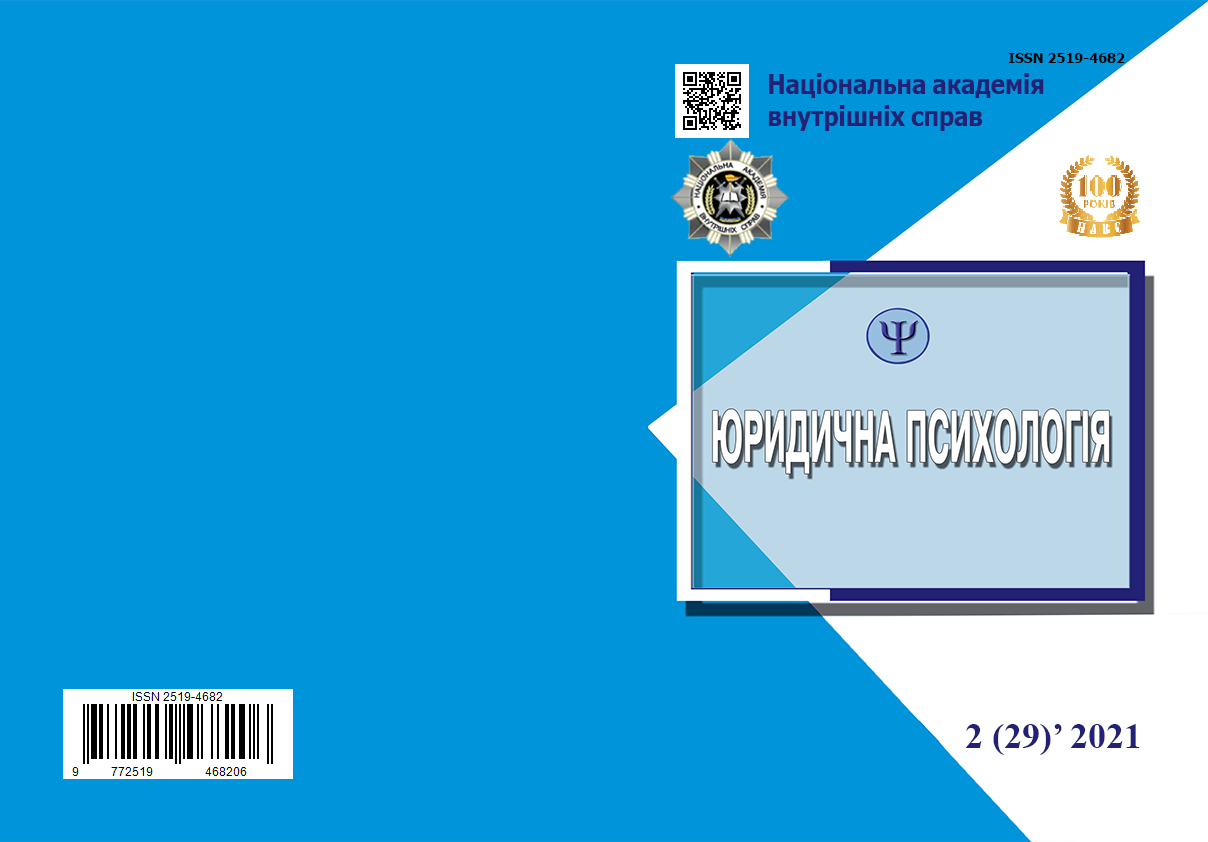Legal and Psychological Principles of Gender Equality in the Activities of the National Police of Ukraine
Abstract
The purpose of the article is to highlight the features of legal regulation and psychological support of gender equality in the activities of the National Police of Ukraine. Methodology. The methodological tools were chosen taking into account the goal, the specifics of the object and subject of research. The general dialectical method of scientific knowledge of legal phenomena, as well as their connections with the practical activities of the National Police of Ukraine is decisive. The scientific novelty is the separation of legal bases for gender equality in policing, which are based on the provisions of international and national regulations, decisions of the European Court of Human Rights, regulate the defined area of legal relations. It is substantiated that the psychological principles of gender equality in the National Police are compliance with a number of principles: interaction and cooperation in solving official tasks regardless of gender, gender identity, other social, psychological, cultural characteristics, equal distribution of responsibilities, willingness to help; friendly attitude during the performance of official duties, as well as overtime; mutual respect and tolerant attitude to individuals, groups, society. Conclusions. The legal sources that regulate gender equality in policing are grouped into the following groups: international legal documents that define the fundamental legal framework for gender equality; normative legal acts of Ukraine, which regulate ensuring gender equality in police activity; court decisions of international and national courts, which interpret the above sources of law. It is substantiated that in the units of the National Police in order to psychologically ensure gender equality should conduct educational work. Such measures should be implemented in the entire system of professional training of police officers: initial professional training; training in higher educational institutions with specific learning conditions; postgraduate education; job training. In addition to mastering the theory and practice, such educational activities should include: research of the psychological climate in the unit, finding out the level of gender education of police officers; timely identification of problematic issues, including the facts of gender-based violence and the application of response measures, conducting classes on gender equality. Only a systematic and comprehensive approach to the legal and psychological foundations of gender equality in the activities of the National Police of Ukraine can ensure the result of law enforcement in psychologically comfortable working conditions.
Keywords: gender equality; National Police; legal regulation; psychological support
Downloads
References
Даудова Г. В. Формування та реалізація державної гендерної політики в Україні : дис. ... канд. наук з держ. упр. : 25.00.02. Харків, 2008. 221 с.
Демчина О. Гендерна толерантність як соціально-психологічний феномен. Збірник наукових праць: психологія. 2019. Вип. 23. С. 35–41. doi: 10.15330/psp.23.35–41.
Дрозд О. Ю. Забезпечення гендерної рівності в системі МВС України: питання сьогодення. Науковий вісник публічного та приватного права. 2020. Вип. 3. С. 112–116. doi: https://doi.org/10.32844/2618-1258.2020.3.20.
Фулей Т. Застосування принципу гендерної рівності у практиці Європейського суду з прав людини. Підприємництво, господарство і право. 2019. № 8. С. 175–180. doi: https://doi.org/10.32849/2663-5313/2019.8.33.
Камінська Н. В., Чернявський С. С., Перунова О. С. Законодавче регулювання та міжнародні стандарти гендерної рівності : лекція. Київ : Нац. акад. внутр. справ, 2020. 23 с.
Клименко М. В. Гендерна рівність у трудових правовідносинах: питання сьогодення. Актуальні проблеми держави і права. 2021. № 90. С. 77–82. doi: https://doi.org/10.32837/apdp.v0i90.3210.
Константий О. В. Практика Європейського суду з прав людини як джерело судового правозастосування Верховного Суду України. Вісник Верховного Суду України. 2012. № 1 (137). С. 33–36.
Конвенція про захист прав людини і основоположних свобод : міжнар. док. від 4 листоп. 1950 р. URL: https://zakon.rada.gov.ua/laws/show/995_004.
Костіна Т., Булах І. Поняття справедливість та його значення для гендерної психології. Науковий часопис Національного педагогічного університету імені М. П. Драгоманова. 2020. Вип. 12 (57). С. 65–78. (Серія 12 «Психологічні науки»). doi: https://doi.org/10.31392/NPU-nc.series12.2020.12(57).06.
Марценюк Т. Гендерна рівність і недискримінація : посібник. Київ : SIDA, 2014. 65 с.
Права жінок правоохоронців та політика гендерної рівності: досвід інших країн у вітчизняному контексті. URL: https://helsinki.org.ua/articles/prava-zhinok-pravoohorontsiv-ta-polityka-hendernoji-rivnosti-dosvid-inshyh-krajin-u-vitchyznyanomu-konteksti/.
Про схвалення Стратегії розвитку органів систем Міністерства внутрішніх справ на період до 2020 року : розпорядження Кабінету Міністрів України від 15 листоп. 2017 р. № 1023-р. URL: https://zakon.rada.gov.ua/ laws/show/1023-2017-%D1%80#Text.
Про затвердження Національного плану дій з виконання резолюції Ради Безпеки ООН 1325 «Жінки, мир, безпека» на період до 2025 року : розпорядження Кабінету Міністрів України від 28 жовт. 2020 р. № 1544-р. URL: https://zakon.rada.gov.ua/laws/show/1544-2020-%D1%80#Text.
Стратегія гендерної рівності Ради Європи на 2018–2023 роки. Квітень 2018 р. URL: https://rm.coe.int/prems-041318-gbr-gender-equality-strategy-2023-ukr-new2/16808b35a4.
Про Національну поліцію України : Закон України від 2 лип. 2015 р. № 580-VII. URL: https://zakon.rada.gov.ua/laws/show/580-19#Text.
Про забезпечення рівних прав та можливостей жінок і чоловіків : Закон України від 8 верес. 2005 р. № 2866-IV. URL: https://zakon.rada.gov.ua/laws/show/2866-15#Text
Abstract views: 206 PDF Downloads: 302
- Authors reserve the right to authorship of their own work and transfer to the magazine the right of the first publication of this work under the terms of the Creative Commons Attribution License, which allows other persons to freely distribute published work with mandatory reference to authors of the original work and the first publication of an article in this magazine.
- Authors have the right to enter into separate additional agreements on non-exclusive dissemination of the work in the form in which it was published in the journal (for example, to post an article in the institution's repository or to publish as part of a monograph), provided that the link to the first publication of the work in this journal is maintained.
- The journal's policy allows and encourages the posting of articles by authors on the Internet (for example, in electronic storehouses of institutions or on personal websites), both before the submission of this manuscript to the editorial office and during its editorial processing, as this contributes to the creation of a productive scientific discussion and positively affects the efficiency and dynamics of citing the published work.




